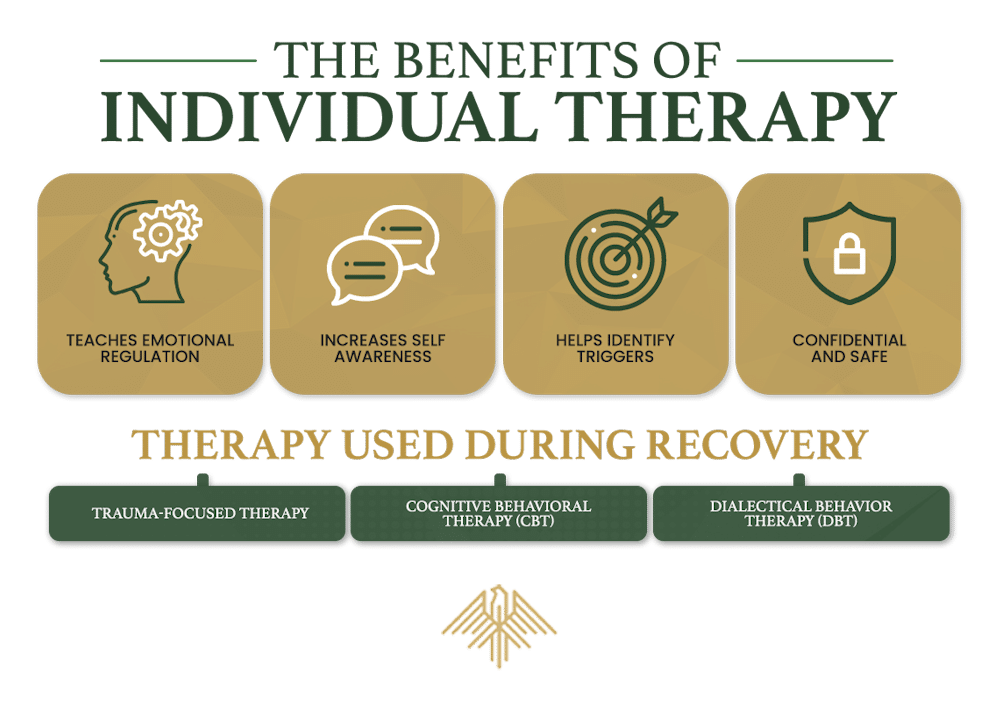Individual Therapy for Addiction
 Through the ages, people have been in search of ways to address and deal with the issues that come up in life. Medical professionals and researchers are continuously working to learn more about mental and physical health conditions. Awareness about such conditions is constantly increasing and treatment solutions are coming to light.
Through the ages, people have been in search of ways to address and deal with the issues that come up in life. Medical professionals and researchers are continuously working to learn more about mental and physical health conditions. Awareness about such conditions is constantly increasing and treatment solutions are coming to light.
Thankfully, psychotherapy is one of the effective methods that has been introduced to the world of mental, emotional, and behavioral health treatment. So, for those who are working to overcome addiction, psychotherapy approaches can prove to be incredibly helpful. One-on-one therapy can be essential to the addiction recovery process.
Here at Eagle Creek Ranch Recovery Ranch in Nampa, Idaho, we offer various types of addiction therapy. We believe counseling is one of the most impactful components of addiction treatment and recovery. We provide individual therapy for addiction as one of our many evidence-based approaches, as it has resulted in successful outcomes in conjunction with other treatment methods.
Individual therapy is a type of psychotherapy that brings a personal approach to therapy. Unlike group therapy, an individual therapy program for addiction does not involve group meetings. Sessions involve only the recovering individual and an addiction therapist. This one-on-one time allows individuals to work through the treatment process, identify psychological issues, and improve communication skills.
What To Expect During Individual Therapy?
In an individual therapy session, those in recovery can expect to interact with a counselor on a one-on-one basis. They can expect to have in-depth conversations about their personal stories. Individual therapy sessions typically involve discussions about the recovering person’s emotions, feelings, and thoughts.
Types Of Individual Therapy For Addiction
Some of the most common types of individual therapy for substance abuse include the following:
This type of individual therapy focuses on clients who have suffered from trauma. Traumatic experiences can lead to long-lasting effects, including reoccurring flashbacks, panic attacks, and dissociation. People can also experience sleep problems, such as nightmares or an inability to fall asleep. Trauma can also lead to self-esteem issues and increased anxiety.
Trauma-focused therapy can address the effects of trauma in a person’s life and introduce healthy coping techniques. If a person suffers from addiction in addition to trauma, therapy can address both issues.
Cognitive behavioral therapy reveals harmful cognitive processes and helps people replace them with positive processes. In other words, CBT identifies harmful thoughts and replaces them with healthy thoughts.
CBT helps people develop coping skills and identify triggers and challenges that could hinder them from remaining on track. Cognitive behavioral therapy sessions can be effective for people who suffer from addiction and co-occurring mental health disorders.
Dialectical behavior therapy is a type of cognitive behavioral therapy. DBT helps people learn how to regulate their emotions. It also instructs people on how to eliminate self-destructive behaviors and equips recovering addicts with relapse-prevention skills.
DBT focuses on improving 4 particular skill sets. These include distress tolerance, emotion regulation, mindfulness, and interpersonal effectiveness.
Contact Eagle Creek Ranch
Recovery Today!
Why Wait? Find The Help You Need By Reaching Out To Us Today! Our Admissions Team Is Standing By.
The Benefits of Individual Therapy for Addiction
Individual therapy for addiction treatment comes with many benefits. Some of the main benefits of a one-on-one therapy program for addiction include the following:
You can rest assured that individual therapy is a confidential approach to recovery. What you discuss with your therapist can remain between the two of you. If anything needs to be discussed with others, you will be aware.
Individual therapy for addiction provides a setting in which people can focus on themselves. So, in an individual therapy session, you can simply concentrate on your own needs. Through one-on-one discussions with a therapist, an individual can develop a deeper understanding of himself or herself. Individual counseling can uncover the causes of addiction in your life and reveal deep-rooted issues.
Once these issues have been exposed, you can work more effectively to overcome them. As individual therapy explores the life of the person in recovery, it also works to equip the individual with skills for relapse prevention. By learning more about yourself, you can also determine the best way to address triggers, challenges, and obstacles throughout recovery.
While general group therapy can be effective, it can be difficult to talk about your challenges and struggles with a group of people. Fear of being judged can prevent people from speaking freely in group therapy settings. But individual counseling provides a safe space where people can talk about their experiences without judgment from anyone.
It can be difficult to deal with emotions while in recovery from substance abuse. An individual therapy program for addiction can assist people in regulating their emotions. Counseling that takes place in a one-on-one setting enables people to focus on their own emotional needs.
Individual therapy for drug and alcohol addiction can help people to discover their triggers. This may be more challenging to do in a group therapy setting. But, individual counseling allows people to dive more deeply into their own lives and explore the truth about their struggle with alcohol and drug abuse.
Knowing what your triggers are can be one of the most effective ways to avoid relapsing. By understanding what triggers the desire to drink alcohol or use drugs, you can develop a plan to work through such challenges when they arise. Identifying your triggers can make an incredibly huge difference in your addiction recovery journey. Fortunately, individual counseling can help with this.
Triggers can come in various forms, including stress, anxiety, or depression. Loneliness or boredom can trigger substance abuse, too. Also, certain settings or groups of people can trigger harmful thoughts and, eventually, lead to relapse. For example, parties, where people are drinking, can lead you to fall back into substance use. Or, being around people who use drugs can cause you to relapse.
Many times, people who suffer from substance abuse struggle to feel emotionally safe around others. Sometimes, this is due to a lack of emotional stability in the past. Perhaps childhood trauma or relationship abuse contributed to the development of addiction in their lives. Or, maybe they struggled to trust people when they were actively using drugs or alcohol. Regardless of the cause, emotional security is often hard to come by for those who suffer from addiction.
Individual therapy helps to reestablish this necessary sense of security. While learning more about yourself, you can also receive support and guidance from your therapist. You can develop a sense of trust for yourself and your counselor. This safe emotional relationship can help bring the healing you need and prepare you to build friendships and family relationships throughout your recovery.
Individual therapy sessions can help people develop better communication skills as it requires open discussion about one’s feelings and struggles. Individual sessions can also help people to develop and maintain healthy relationships with others. Although group therapy options allow people to develop interpersonal relationship skills and communication skills, an individualized approach enables people to continue working on these social skills throughout the recovery process.
Individual Therapy for Addiction
Individual therapy for substance use disorder can be used to treat any of the following conditions and disorders:
- Alcohol addiction
- Meth addiction
- Heroin addiction
- Cocaine addiction
- Prescription drug addiction
- Mental health disorders
Psychotherapy for substance abuse is best when used in tandem with other treatment approaches. So, those who enter rehab here at Eagle Creek Ranch Recovery can expect to receive support through therapy while recovering through our other rehab programs. These rehab programs include detoxification and residential treatment.
Breaking the Cycle Through Individual Therapy for Addiction
Addiction treatment requires a multifaceted approach. There is no one-size-fits-all method for addressing substance use disorders and mental health challenges. Instead, addiction and mental health treatment should be adjusted to meet the specific and unique needs of those in recovery.
Working to overcome alcohol and drug abuse can be incredibly challenging. Those who are striving to maintain abstinence from substance use typically encounter many obstacles along the way. But with the help of support groups, peer support, comprehensive treatment programs, mental health services, individual counseling, and other therapies, the recovery process can break free from the bondage of addiction.
At Eagle Creek Ranch Recovery, our mission is to provide our clients with the care they need to overcome addiction. We believe that the best way to do this is to use treatment methods that can adapt to the recovery needs of our clients. Therapy is one of those methods, in addition to our other approaches.
Learn More About Our Addiction Therapy Services Today
Those who abuse alcohol or drugs often struggle to understand the reasoning behind their drug or alcohol cravings. But, behavioral therapies can uncover the contributing factors of drug or alcohol use and determine the best way to address these issues.
In addition to the therapeutic elements of our comprehensive treatment plan, we offer various programs for drug and alcohol abuse treatment. Through our drug and alcohol detox service, we provide individuals with the opportunity to end substance use. Our clinical professionals can ensure a safe withdrawal process with medical supervision and guidance. Our clients can also enter our residential treatment program, which provides access to around-the-clock care.
Here at our Idaho addiction treatment center, individuals can receive the care they need. Our individual therapy program for addiction can assist all those who are working to end substance abuse. To learn more, please reach out to us today. We look forward to walking with you or your loved one toward a life of freedom from addiction.

Clinical Director
Kendall Maloof is the clinical director at Eagle Creek Ranch Recovery. She is a licensed marriage and family therapist and has held multiple leadership roles before settling here at Eagle Creek. Kendall received her master’s degree in marriage and family therapy from the Chicago School of Professional Psychology in 2016. Her career in mental and behavioral health began in 2014 when she took up internships in both the nonprofit and for profit sectors. She interned at multiple reputable companies, such as The Living Success Center and 449 Recovery in California.
In 2019, Kendall became the clinical director of Sunsets Recovery for Woman, a dual diagnosis program in southern California. Kendall is a natural leader. She has an incredible ability to problem solve and stay calm in any situation. Kendall never fails to show up when she is needed, and her calm demeanor makes her team and clients feel at ease. Eagle Creek Ranch Recovery is proud to have Kendall as our clinical director.




